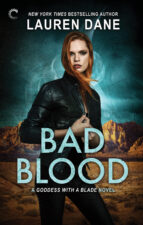|
Feb
13 2007 | ||
This morning I came across this entry at LJ, which linked to this blog entry by agent Miriam Goderich on taking criticism.
There’s a lot out in the internet about authors being thin skinned and frankly, that’s bunk. Are some? Sure. But in order to make it and be succesful, to truly make yourself a better writer with each book, you’ve got to deal with rejection and criticism on a regular basis.
One of the most pertinent passages is below:
I sincerely believe that authors (or any artist for that matter) must be able to defend their vision of and approach to their work. But, they should also have the ability (and humility) to look at the manuscript they’ve slaved away on for months or years and see it as a living, evolving thing that is never going to be absolutely perfect and that will probably benefit from an informed and caring review. They should also understand that in this agent/client partnership it’s in no one’s interest to purposely give bad advice and that only a sadist takes pleasure in inflicting pain. Over the years, I’ve come to the conclusion that knowing how to take criticism with grace is an indicator of success in our business. It’s often what separates those who have thriving writing careers and those who just sit around darkly muttering over their rejection letters.
I like to think of dealing with edits and revision letters as a state of mind. It takes a completely different kind of thinking than writing does. Ego has to be dropped and patience embraced. Your first reaction is defensiveness, this is, after all, your book. something I really try to hold onto is to keep in mind that your agent, or editor is giving you an opportunity to make the manuscript better and also giving you the benefit of their experience.
I’ve learned a lot about writing from my editors. I’ll say that up front and often. Each time a book goes through the process I learn more about streamlining my language, about dangling participles (gah), about how to make a story flow better. A good editor is your best advocate. Does that mean I don’t argue with them sometimes when I think they’re missing something? What it does mean is that I take 90% of their suggestions, reject 5% and discuss the last 5% which can fall either way.
Yes, I have had one negative editing experience. Out of eighteen contracts, that’s not bad at all. And it taught me a lot about what the appropriate time to defend your work is and about what it means to really stand up for yourself versus take editing suggestions. There’s a fine balance there and with an editor you can trust and respect, it’s not hard to see what and when it’s time to argue over.
My agent is also very hands on, which is quite helpful. She puts a lot of time and effort into not just a pitch plan but also revision notes on manuscripts. It’s her job to sell my books so I’d be wasting my time to get upset with her for making suggestions on how to improve the manuscript, no? There are times when she and I see things from totally different perspectives but I respect her opinion and she believes in my writing and so far, we’ve worked well together. I can’t complain about that and I think she’s also contributed to making me a better writer.
In the end, I think the comment in Miriam’s blog entry about humility is spot on. My job is to write books. They are not perfect and the people in my life whose job it is to sell them and buy them is to make them better. Approaching the process of producing a book as a business, as something that is in many ways collaborative, is your path to success. Does that mean I haven’t muttered in the dark about rejection letters while cursing some editor or agent for not seeing my total awesomness? Bwah! ‘Course not. But the key is keeping the muttering short lived and moving on.




